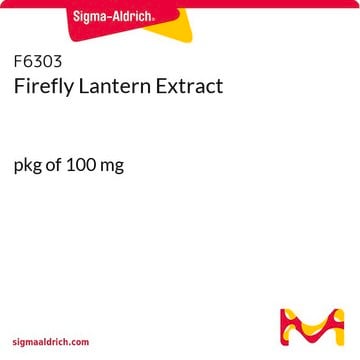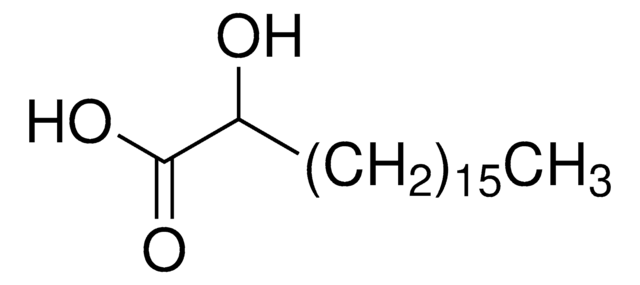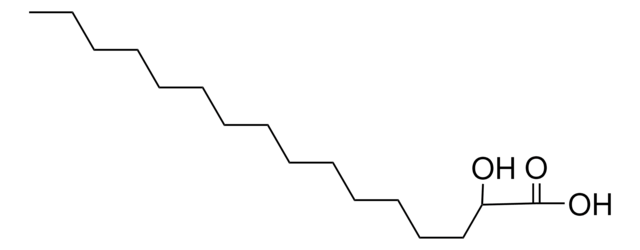すべての画像(1)
About This Item
実験式(ヒル表記法):
C10H20O3
CAS番号:
分子量:
188.26
MDL番号:
UNSPSCコード:
12352211
PubChem Substance ID:
NACRES:
NA.25
おすすめの製品
アッセイ
≥98%
形状
powder
官能基
carboxylic acid
脂質タイプ
saturated FAs
輸送温度
ambient
保管温度
2-8°C
SMILES記法
CCCCCCCC(O)CC(O)=O
InChI
1S/C10H20O3/c1-2-3-4-5-6-7-9(11)8-10(12)13/h9,11H,2-8H2,1H3,(H,12,13)
InChI Key
FYSSBMZUBSBFJL-UHFFFAOYSA-N
アプリケーション
- LORE receptor homomerization is required for 3-hydroxydecanoic acid-induced immune signaling and determines the natural variation of immunosensitivity within the Arabidopsis genus.: This study unveils the crucial role of 3-Hydroxydecanoic acid in mediating immune responses through LORE receptor homomerization in plants, providing insights into the molecular mechanisms of plant defense and potential agricultural applications (Eschrig et al., 2024).
保管分類コード
11 - Combustible Solids
WGK
WGK 3
引火点(°F)
Not applicable
引火点(℃)
Not applicable
個人用保護具 (PPE)
Eyeshields, Gloves, type N95 (US)
適用法令
試験研究用途を考慮した関連法令を主に挙げております。化学物質以外については、一部の情報のみ提供しています。 製品を安全かつ合法的に使用することは、使用者の義務です。最新情報により修正される場合があります。WEBの反映には時間を要することがあるため、適宜SDSをご参照ください。
Jan Code
H3648-BULK:
H3648-25MG:
H3648-5MG:
H3648-VAR:
試験成績書(COA)
製品のロット番号・バッチ番号を入力して、試験成績書(COA) を検索できます。ロット番号・バッチ番号は、製品ラベルに「Lot」または「Batch」に続いて記載されています。
この製品を見ている人はこちらもチェック
B Füchtenbusch et al.
Applied microbiology and biotechnology, 53(2), 167-172 (2000-03-10)
Screening experiments identified several bacteria which were able to use residual oil from biotechnological rhamnose production as a carbon source for growth. Ralstonia eutropha H16 and Pseudomonas oleovorans were able to use this waste material as the sole carbon source
E Déziel et al.
Biochimica et biophysica acta, 1440(2-3), 244-252 (1999-10-16)
Liquid chromatography/mass spectrometry using electrospray ionisation was used to analyse rhamnolipids produced by a Pseudomonas aeruginosa strain with mannitol or naphthalene as carbon source. Identification and quantification of 28 different rhamnolipid congeners was accomplished using a reverse-phase C(18) column and
Ahmad Mohammad Abdel-Mawgoud et al.
Applied microbiology and biotechnology, 86(5), 1323-1336 (2010-03-26)
Rhamnolipids are glycolipidic biosurfactants produced by various bacterial species. They were initially found as exoproducts of the opportunistic pathogen Pseudomonas aeruginosa and described as a mixture of four congeners: alpha-L-rhamnopyranosyl-alpha-L-rhamnopyranosyl-beta-hydroxydecanoyl-beta-hydroxydecanoate (Rha-Rha-C(10)-C(10)), alpha-L-rhamnopyranosyl-alpha-L-rhamnopyranosyl-beta-hydroxydecanoate (Rha-Rha-C(10)), as well as their mono-rhamnolipid congeners Rha-C(10)-C(10)
Florian Bredenbruch et al.
Journal of bacteriology, 187(11), 3630-3635 (2005-05-20)
The role of intercellular communication in the regulation of bacterial multicellular behavior has received widespread attention, and a variety of signal molecules involved in bacterial communication have been discovered. In addition to the N-acyl-homoserine lactones, 4-hydroxy-2-alkylquinolines (HAQs), including the Pseudomonas
Hannes Löwe et al.
Biotechnology for biofuels, 10, 190-190 (2017-08-18)
One of the major challenges for the present and future generations is to find suitable substitutes for the fossil resources we rely on today. Cyanobacterial carbohydrates have been discussed as an emerging renewable feedstock in industrial biotechnology for the production
ライフサイエンス、有機合成、材料科学、クロマトグラフィー、分析など、あらゆる分野の研究に経験のあるメンバーがおります。.
製品に関するお問い合わせはこちら(テクニカルサービス)


![ポリ[(R)-3-ヒドロキシ酪酸] natural origin](/deepweb/assets/sigmaaldrich/product/structures/129/476/7d1c924b-f644-4889-a2d6-d7a923ce382c/640/7d1c924b-f644-4889-a2d6-d7a923ce382c.png)









